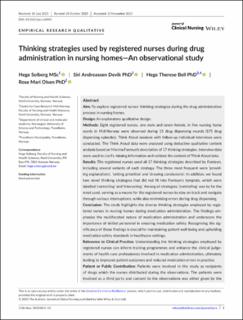| dc.contributor.author | Solberg, Hege | |
| dc.contributor.author | Devik, Siri Andreassen | |
| dc.contributor.author | Bell, Hege Therese | |
| dc.contributor.author | Olsen, Rose Mari | |
| dc.date.accessioned | 2023-12-20T11:57:12Z | |
| dc.date.available | 2023-12-20T11:57:12Z | |
| dc.date.created | 2023-12-04T16:13:40Z | |
| dc.date.issued | 2023 | |
| dc.identifier.citation | Solberg, H., Devik, S. A., Bell, H. T. & Olsen, R. M. (2023). Thinking strategies used by registered nurses during drug administration in nursing homes—An observational study. Journal of Clinical Nursing. doi: | en_US |
| dc.identifier.issn | 1365-2702 | |
| dc.identifier.uri | https://hdl.handle.net/11250/3108379 | |
| dc.description.abstract | Aim: To explore registered nurses' thinking strategies during the drug administration process in nursing homes. Design: An exploratory qualitative design. Methods: Eight registered nurses, one male and seven female, in five nursing home wards in Mid-Norway were observed during 15 drug dispensing rounds (175 drug dispensing episodes). Think Aloud sessions with follow-up individual interviews were conducted. The Think Aloud data were analysed using deductive qualitative content analysis based on Marsha Fonteyn's description of 17 thinking strategies. Interview data were used to clarify missing information and validate the content of Think Aloud data. Results: The registered nurses used all 17 thinking strategies described by Fonteyn, including several variants of each strategy. The three most frequent were ‘providing explanations’, ‘setting priorities’ and ‘drawing conclusions’. In addition, we found two novel thinking strategies that did not fit into Fonteyn's template, which were labelled ‘controlling’ and ‘interacting’. Among all strategies, ‘controlling’ was by far the most used, serving as a means for the registered nurses to stay on track and navigate through various interruptions, while also minimising errors during drug dispensing. Conclusion: The study highlights the diverse thinking strategies employed by registered nurses in nursing homes during medication administration. The findings emphasise the multifaceted nature of medication administration and underscore the importance of skilled personnel in ensuring medication safety. Recognising the significance of these findings is crucial for maintaining patient well-being and upholding medication safety standards in healthcare settings. Relevance to Clinical Practice: Understanding the thinking strategies employed by registered nurses can inform training programmes and enhance the clinical judgements of health care professionals involved in medication administration, ultimately leading to improved patient outcomes and reduced medication errors in practice. | en_US |
| dc.description.abstract | Thinking strategies used by registered nurses during drug administration in nursing homes — An observational study | en_US |
| dc.language.iso | eng | en_US |
| dc.publisher | Wiley | en_US |
| dc.rights | Navngivelse 4.0 Internasjonal | * |
| dc.rights.uri | http://creativecommons.org/licenses/by/4.0/deed.no | * |
| dc.title | Thinking strategies used by registered nurses during drug administration in nursing homes — An observational study | en_US |
| dc.type | Peer reviewed | en_US |
| dc.type | Journal article | en_US |
| dc.description.version | publishedVersion | en_US |
| dc.rights.holder | © 2023 The Author(s) | en_US |
| dc.source.pagenumber | 11 | en_US |
| dc.source.journal | Journal of Clinical Nursing | en_US |
| dc.identifier.doi | https://doi.org/10.1111/jocn.16945 | |
| dc.identifier.cristin | 2208693 | |

